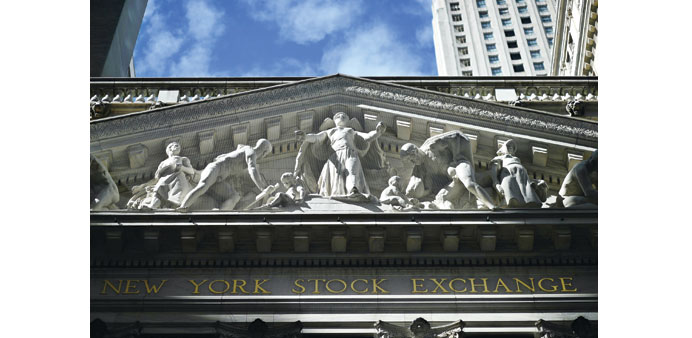Reuters
New York
With earnings season underway, Wall Street is temporarily putting the US Federal Reserve and macroeconomic policy on the back burner in favour of a focus on individual company results and forecasts for a pulse on the economy’s health.
A slew of big banks, including JPMorgan Chase & Co and Bank of America Corp are due to report first-quarter earnings this week, providing an expected bright spot in an otherwise gloomy quarter.
Profits of companies on the S&P 500 are projected to have declined by 2.9% in the first three months from a year ago, according to Thomson Reuters data. Investors will also be watching other firms, such as Netflix, General Electric Co and Schlumberger NV, to see if corporate America more broadly outperforms the negative forecasts analysts have set for it.
“The market will take a break from Fed watching and actually focus on fundamentals,” said Nicholas Colas, chief market strategist at the ConvergEx Group in New York.
“It’s going to drive a lot of feelings of general investor confidence or concern about the back half of the year,” he said.
Energy companies will likely be hit by a dramatic drop in oil prices since last June. As well, a strong US dollar is expected to eat into the earnings of companies with international exposure as they convert their profits back into dollars.
Big banks start reporting their quarterly earnings on Tuesday, starting with JPMorgan Chase & Co and Wells Fargo & Co. Mortgage lending is expected to prop up US bank earnings for the first quarter, as lower mortgage rates have spurred applications to refinance home loans. Financials have the rosiest outlook among sectors, with analysts projecting first-quarter 2015 earnings to have surged 10.8% from a year ago, according to Thomson Reuters data.
In energy, the worst-performing sector, companies may see first-quarter earnings plummet 64.3% from the same quarter a year ago, according to analyst estimates.
With a mixed bag of recent economic data, many market participants are taking a neutral stance going into earnings season, said King Lip, chief investment officer at Baker Avenue Asset Management in San Francisco.
“They’re not negative, and they’re not particularly bullish,” Lip said. “They’re positioning more neutrally due to the fact that some of the economic data we’ve had pretty recently has been flattish.” Data released Thursday showed the number of Americans filing new claims for jobless benefits rose less than expected for the week ended April 4, in a positive sign for the labour market after a slowdown in job growth in March.
Despite the mixed macroeconomic reports, there are reasons why stocks should rise during earnings season, said Bruce Zaro, chief technical strategist at Bolton Global Asset Management in Boston.
The S&P 500 rose to a high of 2,119.59 on February 25, on the back of strong fourth-quarter earnings, but then gave up 3.8%, falling to 2,039.69 on March 11. Then, after rising to another high of 2,114.86 on March 23, the benchmark index fell again, by 3.3%, to 2,045.50 on March 26.
After those significant drops in March, “I would expect individual stocks to make new highs and I think the odds are very good that indexes will reach new highs as well,” Zaro said.

With earnings season underway, Wall Street is temporarily putting the Fed and macroeconomic policy on the back burner in favour of a focus on individ
